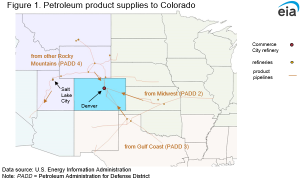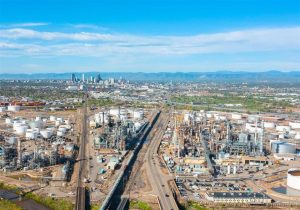
Colorado environmentalists are learning what happens when the oil and gas industry stops production—gasoline prices skyrocket.
It’s what has happened in the state after the December 24, 2022 shutdown of Calgary-based refiner Suncor. The company announced that the 103,000 barrel-a-day oil refinery in Commerce City had been damaged by the extreme cold weather earlier in the month. Repairs would require a full shutdown of the plant and operations until the end of the first quarter of 2023.
Now the U.S. Energy Information Administration reports the refinery outage could complicate the supply of gasoline and diesel in Denver and the Rocky Mountain region. As of Thursday, gasoline price in Colorado averaged $3.94 per gallon. Nearly a dozen counties in northwest Colorado had prices well above $4 a gallon and one county’s average was listed at $5.15.
According to the EIA’s Refinery Capacity Report issued this week, the Commerce City refinery is the only refinery currently active in Colorado, one of the largest states in the Rocky Mountains in terms of population and size of its transportation fuel market.

In 2021, the EIA estimated the state accounted for 41% of total gasoline sales and 25% of total distillate sales (including both jet fuel and diesel) in the Rocky Mountain region. The Commerce City outage means that the refinery will not be producing fuels to meet this demand locally. Instead, the region will need to draw from existing regional inventories and to transfer petroleum products from other out-of-state refineries.
Although parts of the Rocky Mountain region are relatively isolated from major U.S. refining hubs like the Gulf Coast, Colorado has greater pipeline connectivity to other U.S. regions than other states in the Rocky Mountains. So, the transfers from the Midwest and Gulf Coast should partially reduce the need to draw solely from regional inventories.
Magellan Midstream of Oklahoma and Nustar Energy operate pipelines that have some capacity to bring petroleum products into Colorado and Denver, and the outage is likely to increase utilization along these lines.
The Commerce City outage, in combination with other weather-related refinery disruptions in the Rocky Mountains, contributed to a substantial decrease in regional refinery inputs and utilization rates, according to the EIA’s Weekly Petroleum Status Report. Refinery inputs reflect the amount of crude oil processed by refineries, while utilization measures total inputs divided by the total refining capacity available.
Source: EIA






